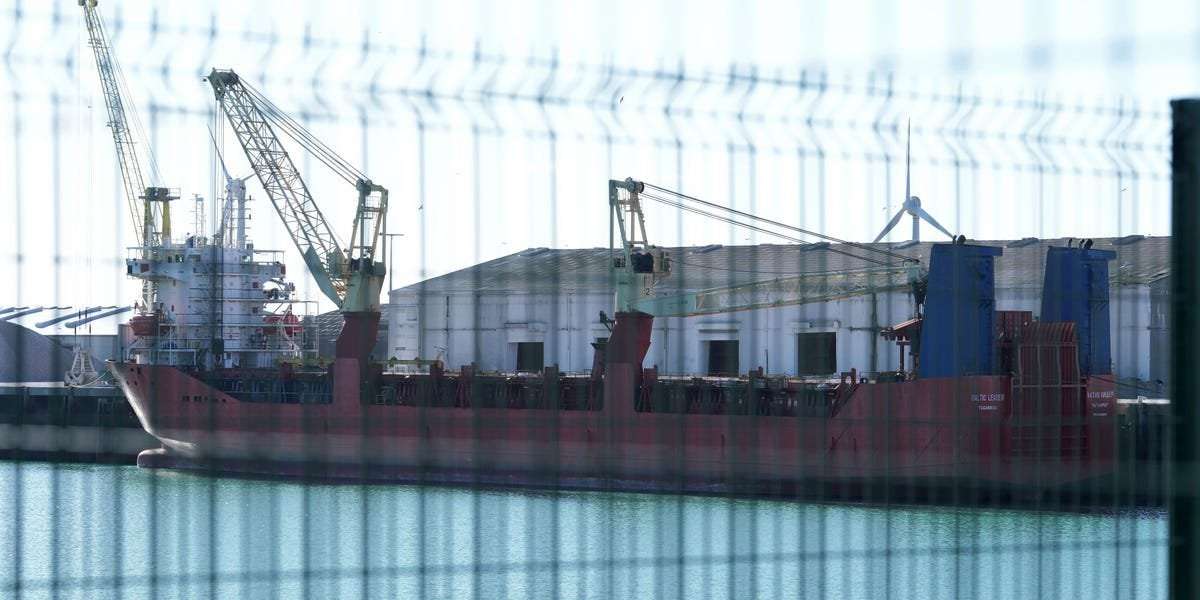18 vessels ditched their Russian flags in March — more than three times the normal rate.
They're re-flagging under nations like the Marshall Islands, according to Windward AI.
The tactic — while legal — could allow businesses to hide their connections with Russia.
Get the latest tech news & scoops — delivered daily to your inbox. Loading Something is loading. Email address By clicking ‘Sign up’, you agree to receive marketing emails from Insider as well as other partner offers and accept our Terms of Service and Privacy Policy
An abnormally high number of ships ditched their Russian flags this March and re-registered to nations such as the Marshall Islands and St. Kitts, according to data provided by Windward AI, a maritime risk consultancy.
A total of 18 ships changed their Russian flag to a different nationality during the month of March. That's more than three times the normal rate of 5.8, Windward's data showed. Five of the vessels are linked to Russian ownership.
The tactic — while legal — could allow businesses to hide their connections to the Russian regime and "deceive authorities" in order to evade sanctions, Windward said in its monthly report.
"Right now, tracking a Russian vessel with a Russian flag is very easy," Windward CEO Ami Daniel said in an interview with Insider. "If you build a shell company, you put a vessel in there with a new name … I think it's a different ball game."
In the shipping industry, a vessel's flag signifies the nation it is registered in, which then has legal jurisdiction over the ship. In fact, in most cases, a vessel's flag is a different nationality from the business that actually owns it. About three-quarters of ships are registered in a country separate from where they're owned, according to the BBC.
Eleven of the Russian ships that changed their flags in March registered instead to the Marshall Islands, a nation with an "open registry" that allows the registration of all vessels, no matter their origin. Insider previously reported on the popular cost-saving loophole, also known as a "flag of convenience."
Several countries, including the US and the UK, have barred both Russian oil and Russian vessels from ports following the country's invasion of Ukraine. The sanctions against Russian oligarchs have led to a flurry of highly scrutinized ship movement as superyachts and their owners attempt to escape seizure.
But not all flag changes are necessarily an attempt to skirt sanctions. The trend could also include "honest business people trying to continue trading as usual without the potential hurdles that a Russian flag could create for them," the report said.
The high number of Russian flag switches comes amid other abnormal activities, such as Russian tankers turning off their tracking systems. Both tactics are included in a US Treasury advisory from May 2020 that lists seven categories of deceptive shipping practices.
"Bad actors may falsify the flag of their vessels to mask illicit trade. They may also repeatedly register with new flag states ("flag hopping") to avoid detection," the advisory warns.

Useless_or_inept on April 5th, 2022 at 22:31 UTC »
The shipping industry is the pinnacle of globalisation.
There are ships built in China for a mysterious Cypriot company (actually a front for a Singapore investor) who leases it to a Greek shipping line, with Indian & Filipino crew, to transport minerals from a British-owned business in Australia, towards a Dutch port where it's transshipped to a Swiss-owned business in Germany. And all the while the ship carries a Panamanian flag.
Either (1) we accept that there's lots of nuances, or (2) we word our criteria very precisely, or (3) we make lots of stupid generalisations. Most actual sanctions enforcement is (2) but a lot of public discourse about sanctions can be (3).
Almost all international shipping is under flags of convenience. Yes, a Russian flag would make things easier to spot (since the choice between Marshall Islands vs Russian registration is a no-brainer for shipping businesses in the rest of the world), but the flag state isn't what we're actually interested in. If you want to sanction specific companies and oligarchs, then you still need to understand which company owns/operates the ship, just like before. If you want to stop cargo reaching Russian ports then, just like before, you need to understand which port the ship is heading for; the flag won't tell you that. Hypothetically, you might be interested in ships built in Russian shipyards, but there's not many of those sailing internationally.
You can go to some AIS scanner site, like Marinetraffic, and scroll around the map looking at ships in Russian ports, presumably handling cargoes to/from Russian businesses. Few of them (at least the larger vessels making international journeys) are Russian-flagged; it was always thus.
ThomasButtz on April 5th, 2022 at 22:04 UTC »
Flags of Convivence are unfortunately not a novel work around.
green_flash on April 5th, 2022 at 21:34 UTC »
That sort of thing is hardly specific to Russian ships.
https://www.forbes.com/sites/nishandegnarain/2020/09/20/why-isnt-panama-paying-its-fair-share-of-20-of-all-global-shippings-carbon-emissions/